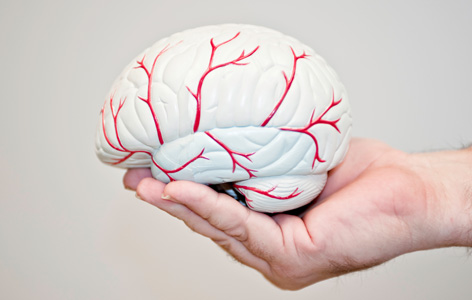Home page Description:
New therapeutic strategy to reduce brain inflammation after stroke shows promise.
Posted On: November 28, 2016

Image Caption:
Two types of strokes can damage brain cells: ischemic strokes, which occur when blood vessels become blocked; and hemorrhagic strokes, which occur when blood vessels burst.
Stroke is a leading cause of long-term disability. People who suffer a stroke often experience neurological problems, such as difficulty using or understanding language, and problems with learning and memory.
The first few hours to days after a stroke are critical for preventing further brain damage. This is because, almost immediately after a stroke, the brain undergoes a potentially toxic inflammatory response. This response involves the release of various proteins in the ‘interleukin’ family. Some interleukins are helpful in the repair process, whereas others can exacerbate damage; thus, one potential therapeutic strategy is to stimulate the release of the interleukins that promote brain repair. However, no such treatments currently exist.
One protein in particular, called interleukin-4 (IL-4), has been shown to induce an anti-inflammatory state that is thought to reduce damage and promote repair. To explore the therapeutic potential of IL-4, Krembil Senior Scientist Dr. Lyanne Schlichter and her team tested whether supplementing the brain with additional IL-4 would lessen stroke-associated damage.
Using experimental models, the researchers artificially raised IL-4 levels and measured markers of inflammation. In this “proof-of-principle” study, a single, early IL-4 treatment increased the levels of several anti-inflammatory markers and immune cells involved in clearing cellular damage—and these levels remained elevated for seven days post-treatment.
“While raising IL-4 levels did not lessen the acute damage to neurons, the heightened and sustained effects on the immune response that we observed are promising,” says Dr. Schlichter. “Future studies are needed to explore whether these long-term reductions in inflammation translate into improved clinical outcomes.”
This work was supported by the Canadian Institutes of Health Research, the Heart and Stroke Foundation and the Toronto General & Western Hospital Foundation.
Molecular and cellular responses to interleukin-4 treatment in a rat model of transient ischemia. Lively S, Hutchings S, Schlichter LC. Journal of Neuropathology & Experimental Neurology. 2016 Sep 15. [Pubmed abstract]
The first few hours to days after a stroke are critical for preventing further brain damage. This is because, almost immediately after a stroke, the brain undergoes a potentially toxic inflammatory response. This response involves the release of various proteins in the ‘interleukin’ family. Some interleukins are helpful in the repair process, whereas others can exacerbate damage; thus, one potential therapeutic strategy is to stimulate the release of the interleukins that promote brain repair. However, no such treatments currently exist.
One protein in particular, called interleukin-4 (IL-4), has been shown to induce an anti-inflammatory state that is thought to reduce damage and promote repair. To explore the therapeutic potential of IL-4, Krembil Senior Scientist Dr. Lyanne Schlichter and her team tested whether supplementing the brain with additional IL-4 would lessen stroke-associated damage.
Using experimental models, the researchers artificially raised IL-4 levels and measured markers of inflammation. In this “proof-of-principle” study, a single, early IL-4 treatment increased the levels of several anti-inflammatory markers and immune cells involved in clearing cellular damage—and these levels remained elevated for seven days post-treatment.
“While raising IL-4 levels did not lessen the acute damage to neurons, the heightened and sustained effects on the immune response that we observed are promising,” says Dr. Schlichter. “Future studies are needed to explore whether these long-term reductions in inflammation translate into improved clinical outcomes.”
This work was supported by the Canadian Institutes of Health Research, the Heart and Stroke Foundation and the Toronto General & Western Hospital Foundation.
Molecular and cellular responses to interleukin-4 treatment in a rat model of transient ischemia. Lively S, Hutchings S, Schlichter LC. Journal of Neuropathology & Experimental Neurology. 2016 Sep 15. [Pubmed abstract]




